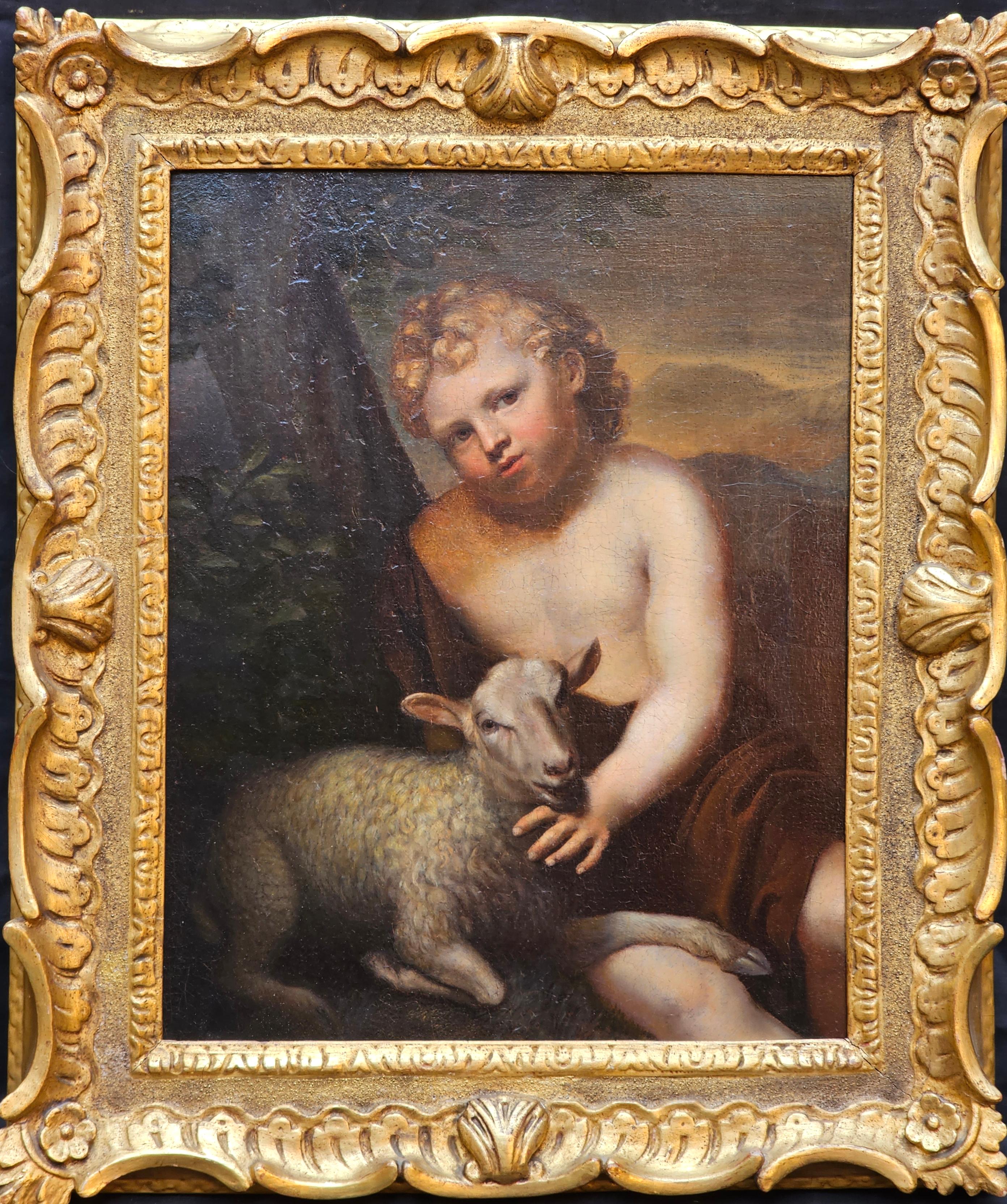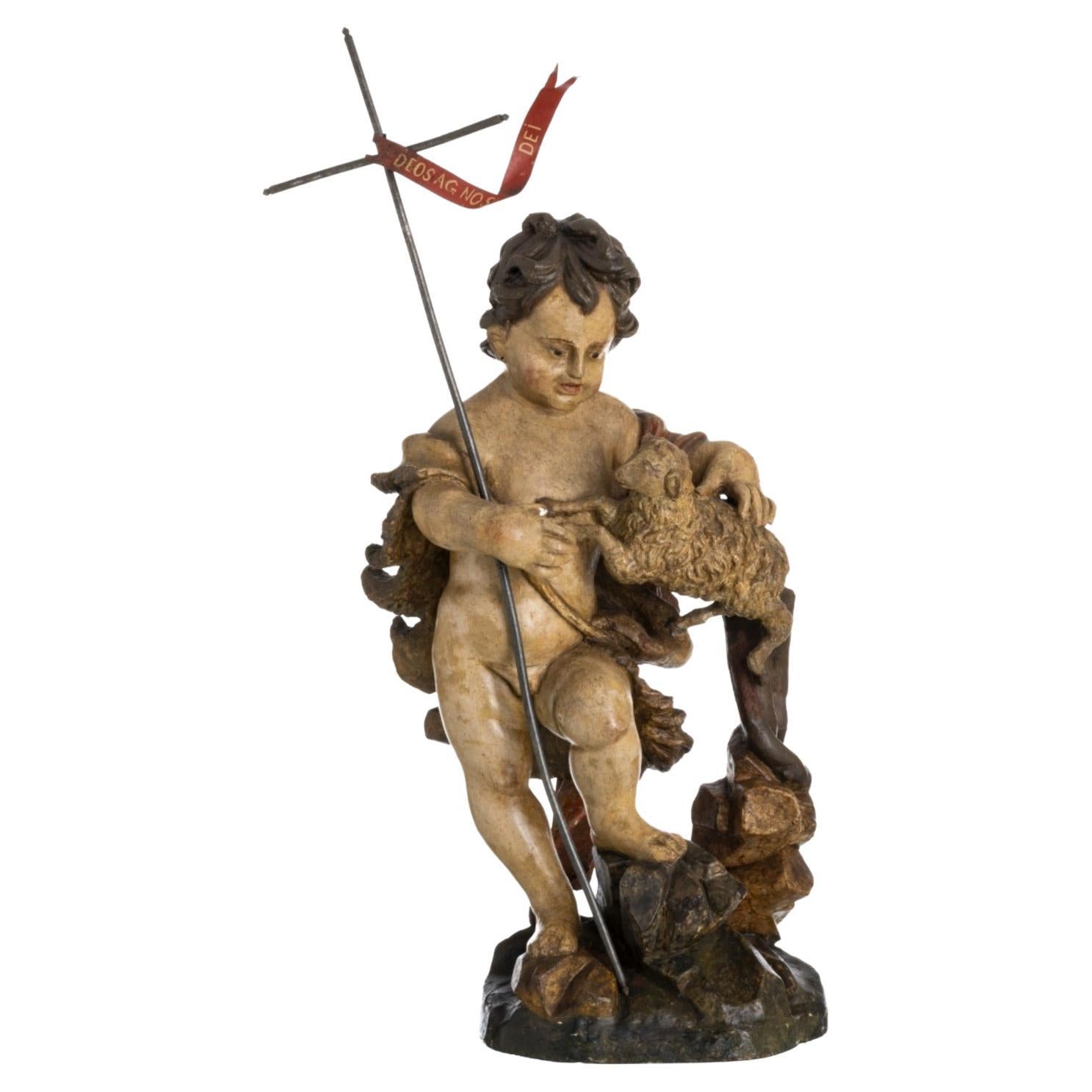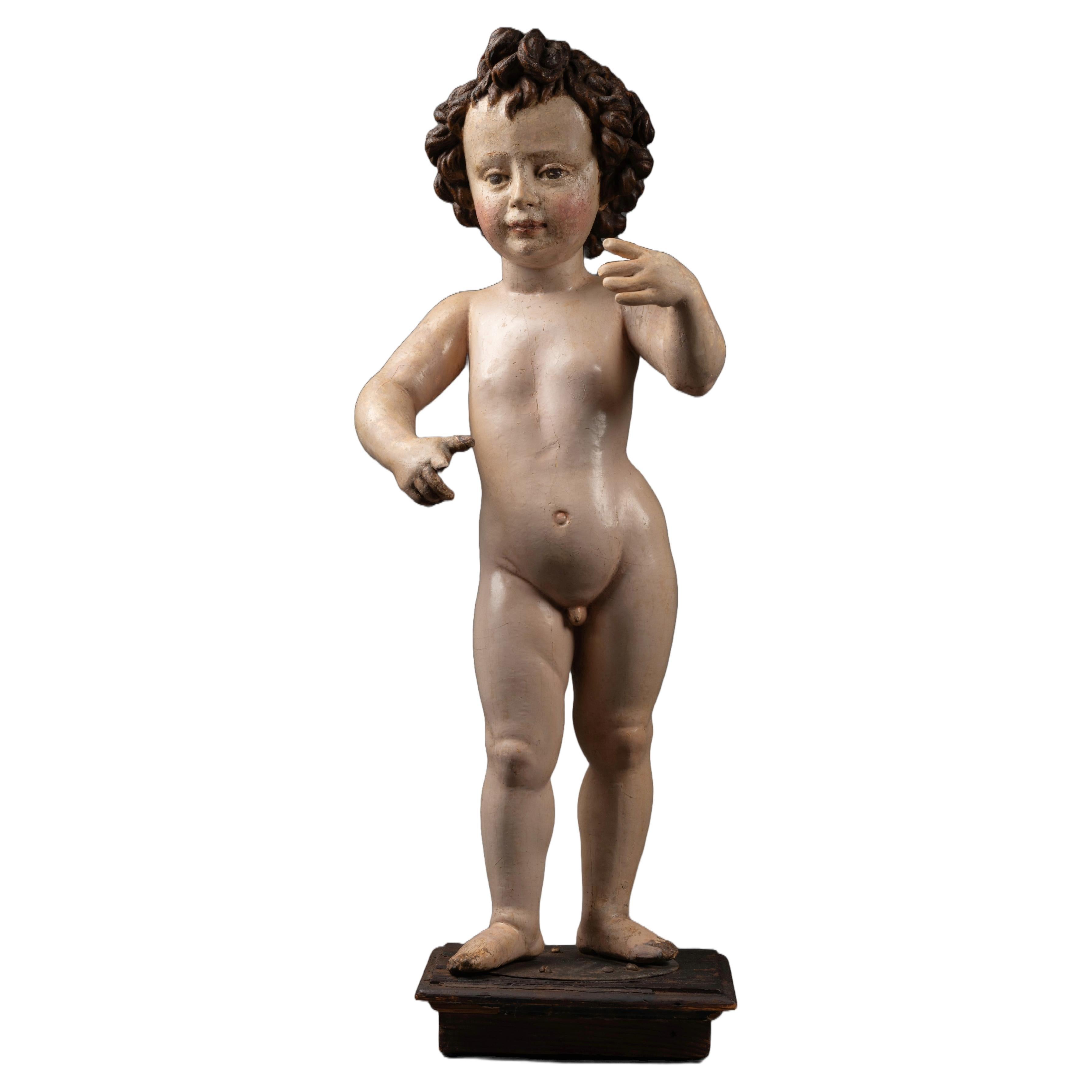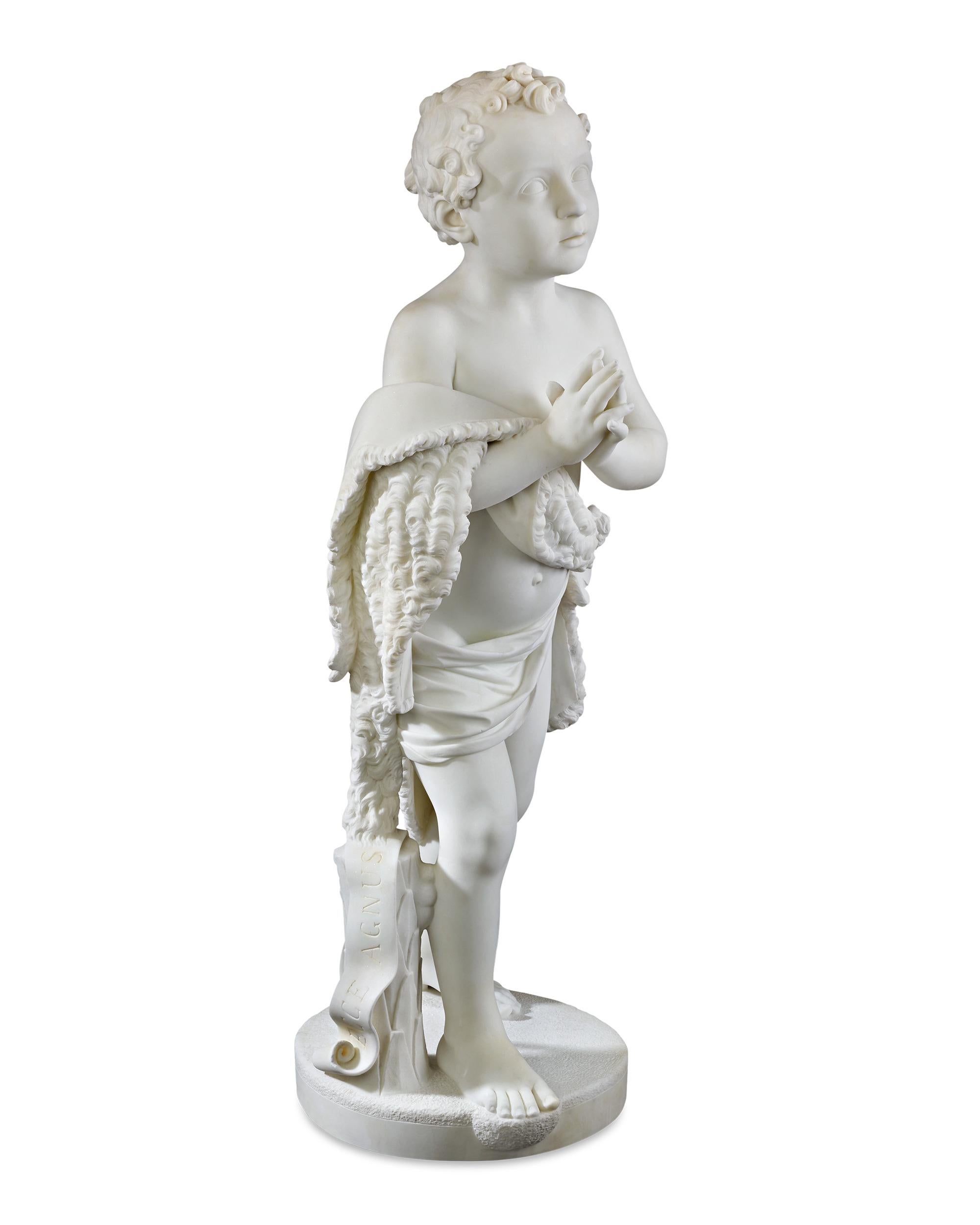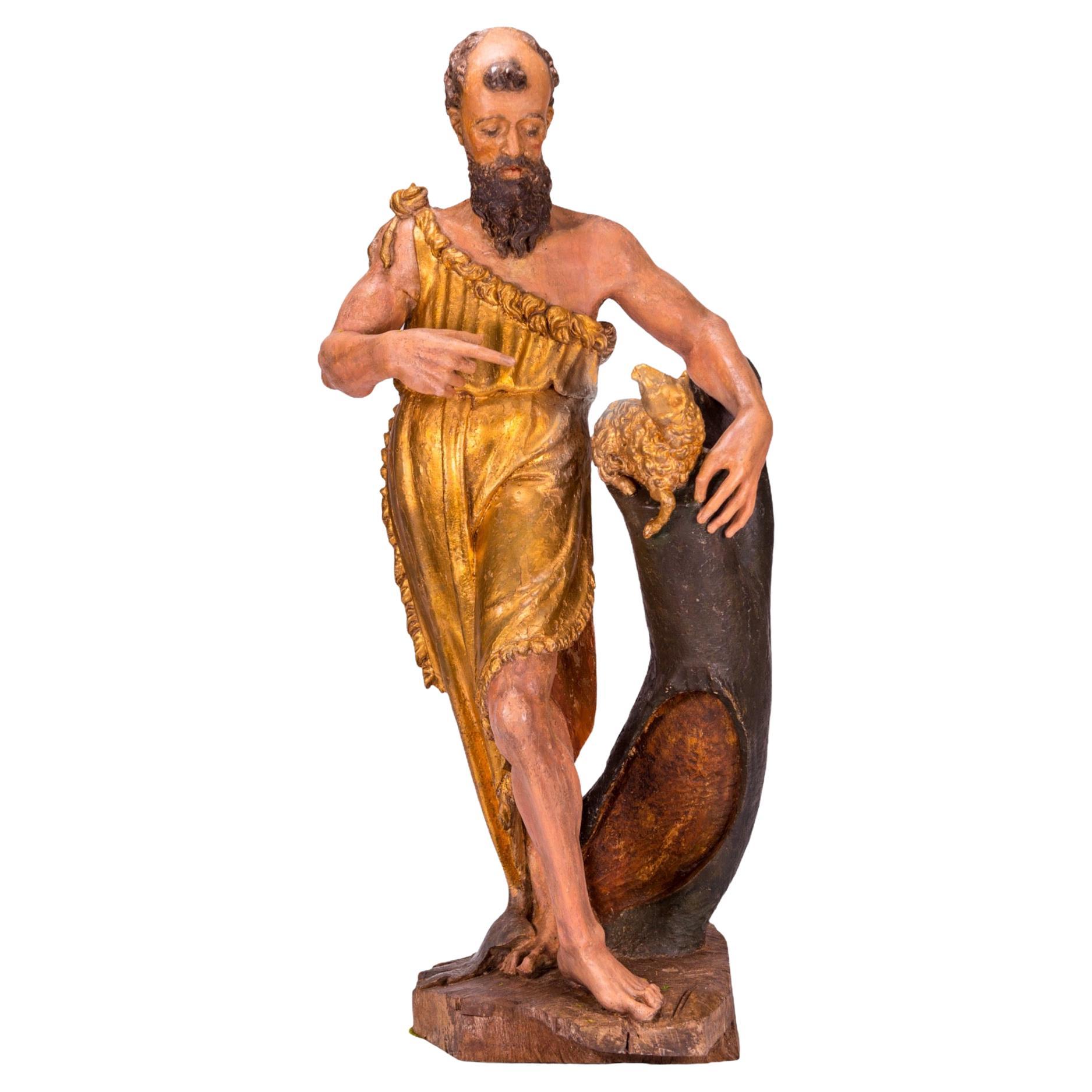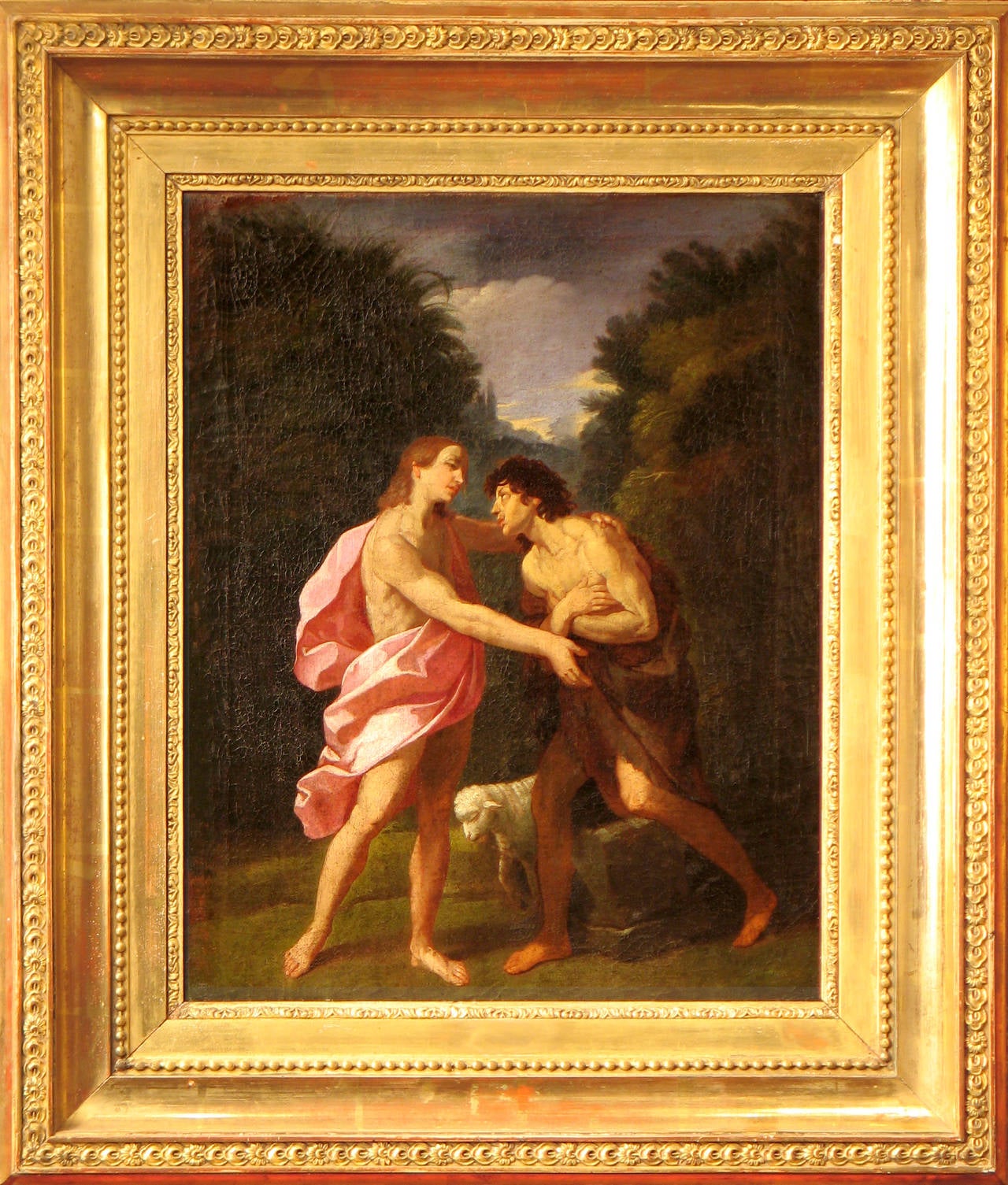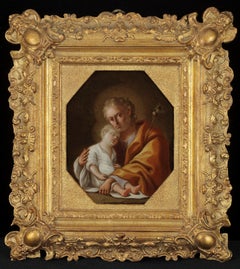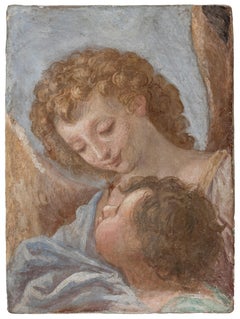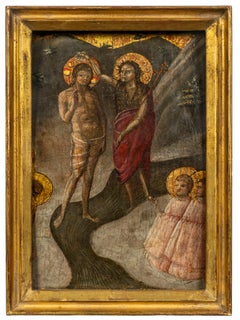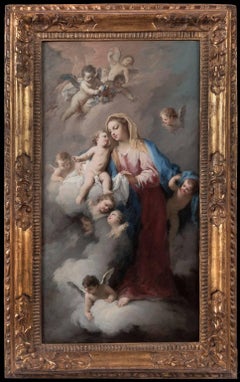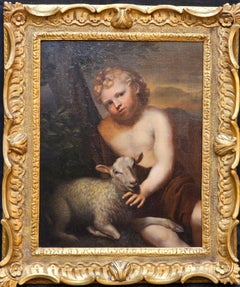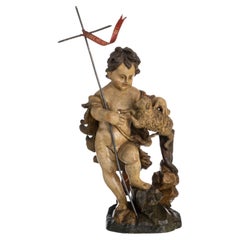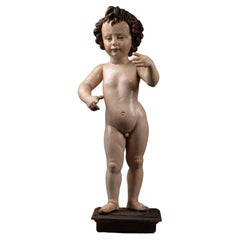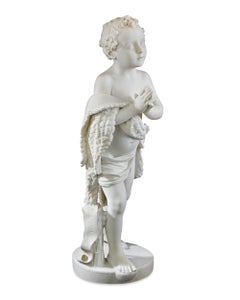Items Similar to The Infant Saint John the Baptist with a Lamb
Want more images or videos?
Request additional images or videos from the seller
1 of 5
The Infant Saint John the Baptist with a Lambafter 1655
after 1655
$30,000
£22,676.28
€26,059.08
CA$41,774.81
A$46,472.77
CHF 24,361.61
MX$567,885.91
NOK 310,214.69
SEK 292,024.22
DKK 194,521.14
Shipping
Retrieving quote...The 1stDibs Promise:
Authenticity Guarantee,
Money-Back Guarantee,
24-Hour Cancellation
About the Item
Provenance:
James Byrnes, Los Angeles (1917-2011)
Giusto Le Court was born Josse or Justus de Corte in the Flemish city of Ypres. His father Jean was a sculptor and presumably his earliest training was with him before he entered the studio of Cornelis van Mildert. The young artist was clearly influenced by the dominant Flemish sculptor of the time, Artus Quellinus the Elder, with whom he may have worked on the decoration of the Amsterdam City Hall.
Following the lead of many northern artists he travelled to Rome, perhaps more than once, before settling in Venice around 1655. It was there, as one of a colony of expatriate artists, that he made his name as a sculptor. One of his first Venetian commissions was for the monument to Alvise Mocenigo in the Church of San Lazzaro dei Mendicanti, where Le Court sculpted the marble figures of Strength and Justice. He also collaborated with the celebrated architect Baldassare Longhena, most famously for the high altar of Santa Maria della Salute, where he carved the multi-figured altarpiece depicting the Queen of Heaven Expelling the Plague.
The present marble sculpture depicts the infant Saint John the Baptist, reclining, wearing his traditional hair-shirt, embracing a lamb, and holding the bottom of his attribute, a reed cross. Attached to his shirt is a baptismal cup, with which he would become associated later in his life. Veneration of the infant Saint John the Baptist was prevalent throughout Italy and images of the saint in childhood—often called “Giovannino,” or little John—are to be found in both domestic and ecclesiastic settings. Sculptures of the infant saint served as adornments for baptisteries, as devotional objects, as personal emblems for men named Giovanni, or simply as gifts commemorating the birth of a child.
The attribution of our sculpture to Giusto Le Court is based on the close resemblance in type and features to other depictions of infants by the artist. Among these is the Allegory of Winter at Ca’ Rezzonico, in Venice (Fig. 1); treatments of the Infant Bacchus in Padua and on the art market (Figs. 2-3); and, perhaps most of all, the pair of putti likely representing Hercules and his brother Iphicles, offered at Sotheby’s, Paris, 4 May 2016, lot 26 (Fig. 4).
The sculpture comes from the collection of James Byrnes, the first curator of modern art at the Los Angeles County Museum of Art, and later Director of both the North Carolina Museum of Art and the New Orleans Museum of Art. The white marble sculpture is presented atop a later red variegated marble base.
- Attributed to:Giusto Le Court (1627 - 1679, French)
- Creation Year:after 1655
- Dimensions:Height: 21.5 in (54.61 cm)Width: 14 in (35.56 cm)Depth: 11 in (27.94 cm)
- Medium:
- Movement & Style:
- Period:
- Condition:
- Gallery Location:New York, NY
- Reference Number:1stDibs: LU1029066322
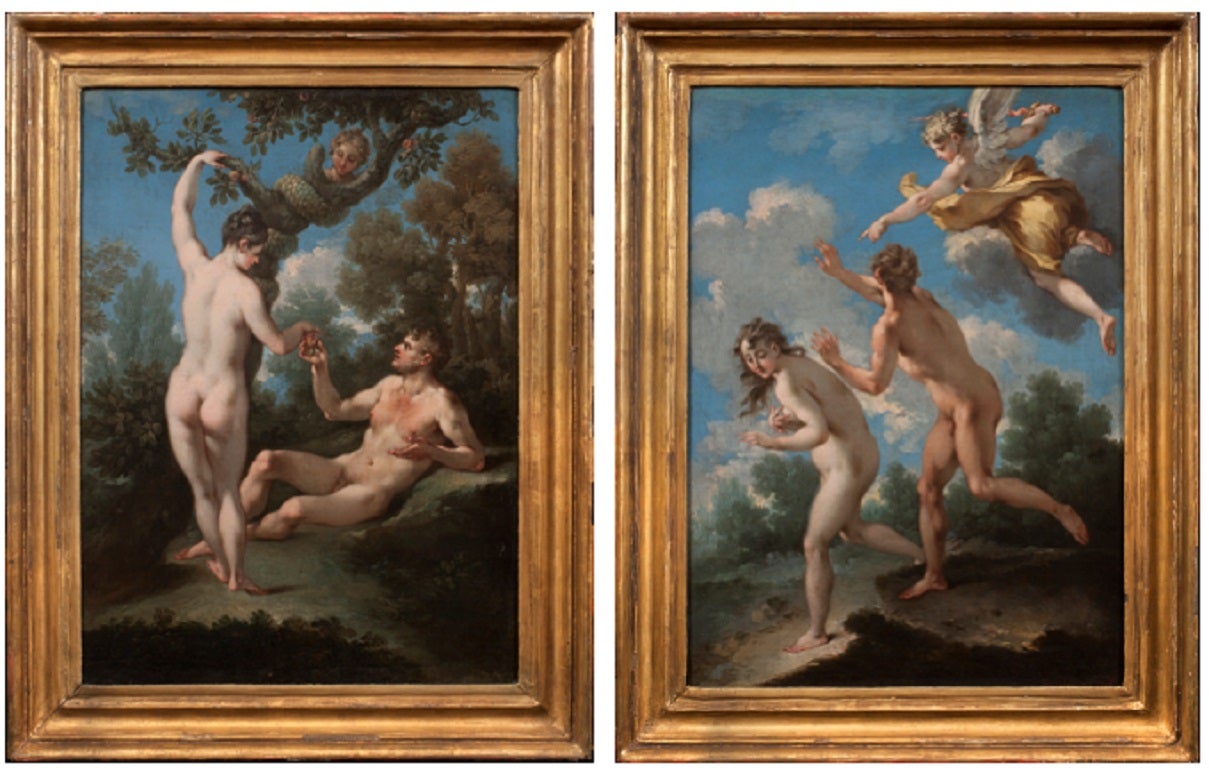
About the Seller
5.0
Recognized Seller
These prestigious sellers are industry leaders and represent the highest echelon for item quality and design.
Established in 1997
1stDibs seller since 2012
22 sales on 1stDibs
Typical response time: 5 hours
- ShippingRetrieving quote...Shipping from: New York, NY
- Return Policy
Authenticity Guarantee
In the unlikely event there’s an issue with an item’s authenticity, contact us within 1 year for a full refund. DetailsMoney-Back Guarantee
If your item is not as described, is damaged in transit, or does not arrive, contact us within 7 days for a full refund. Details24-Hour Cancellation
You have a 24-hour grace period in which to reconsider your purchase, with no questions asked.Vetted Professional Sellers
Our world-class sellers must adhere to strict standards for service and quality, maintaining the integrity of our listings.Price-Match Guarantee
If you find that a seller listed the same item for a lower price elsewhere, we’ll match it.Trusted Global Delivery
Our best-in-class carrier network provides specialized shipping options worldwide, including custom delivery.More From This Seller
View AllJoseph Holding the Christ Child
By Pietro Bardellino
Located in New York, NY
Provenance: Private Collection, Argentina.
A work of great delicacy and intimacy, this small painting on copper by Pietro Bardellino treats a subject which grew in popularity during the Baroque period: Saint Joseph and the Christ child...
Category
18th Century Baroque Paintings
Materials
Copper
A Guardian Angel and a Child
Located in New York, NY
Provenance:
Cornelius Vanderbilt, New York; by whom gifted in 1880 to:
The Metropolitan Museum of Art, New York (80.3.673); deaccessioned and sold:
Christie’s, New York, 12 June 19...
Category
17th Century Old Masters Portrait Paintings
Materials
Terracotta, Gesso
Baptism of Christ
Located in New York, NY
Provenance:
Achillito Chiesa, Milan
Luigi Albrighi, Florence, by 1 July 1955
with Marcello and Carlo Sestieri, Rome, 1969
Private Collection, Connecticut
Exhibited:
Mount Holyoke College Art Museum, South Hadley, Massachusetts (on loan, 2012)
Literature:
Carlo Volpe, “Alcune restituzioni al Maestro dei Santi Quirico e Giulitta,” in Quaderni di Emblema 2: Miscellanea di Bonsanti, Fahy, Francisci, Gardner, Mortari, Sestieri, Volpe, Zeri, Bergamo, 1973, pp. 19-20, fig. 18, as by the Master of Saints Quiricus and Julitta (now identified as Borghese di Piero).
This fine predella panel depicting the Baptism...
Category
15th Century and Earlier Old Masters Figurative Paintings
Materials
Tempera, Wood Panel
Madonna and Child with Angels in the Clouds
Located in New York, NY
Provenance: Charles H. and Virginia Baldwin, Claremont, Colorado Springs, Colorado ca. 1907-1934; thence by descent until sold in 1949 to:
Charles Blevins Davis, Claremont (renamed Trianon), Colorado Springs 1949 -until gifted in 1952 to:
The Poor Sisters of Saint Francis, Trianon, Colorado Springs, 1952 until acquired, 1960, by:
John W. Metzger, Trianon, renamed as the Trianon School of Fine Arts, Colorado Springs, 1960-1967; when transferred to:
The Metzger Family Foundation, Trianon Art Museum, Denver, 1967 - 2004; thence by descent in the Metzger Family until 2015
Exhibited: Trianon Art Museum, Denver (until 2004)
The present work is a spectacular jewel-like canvas by Amigoni, rich in delicate pastel colors, most likely a modello for an altarpiece either lost or never painted. In it the Madonna stands firmly upon a cloud in the heavens, her Child resting on a delicate veil further supported by a cloud, as he gently wraps his arm around his mother’s neck. From above angels prepare to lower flowers and a wreath, while other angels and seraphim surrounding the two joyfully cavort.
Dr. Annalisa Scarpa, author of the forthcoming monograph on Jacopo Amigoni...
Category
18th Century and Earlier Figurative Paintings
Materials
Canvas, Oil
Orpheus and the Animals, A Study after an Ancient Bas-Relief
Located in New York, NY
Inscribed “55” and “218” in the lower right
Watermark: Heawood 1351
Laid down on historic Cassiano Del Pozzo mount
(Mount Type A, 531 x 402 mm)
Provenance:
Commissioned by Cassiano dal Pozzo (1588–1637) for his Museo Cartaceo (Paper Museum) and kept in the library of his palazzo, via dei Chiavari, Rome
Transferred with the entire dal Pozzo collection by fidecommesso to his younger brother, Carlo Antonio dal Pozzo (1606–1689); by descent to his second son:
Gabriele dal Pozzo (d. 1695); by descent to his wife:
Anna Teresa Benzoni and after her remarriage in 1697, the Marchesa Lancellotti de’ Ginnetti (d. 1736); by descent to their son:
Cosimo Antonio dal Pozzo (d. 1740); by whom sold with the Dal Pozzo library in 1703 to:
Pope Clement XI for the Vatican Library; by whom transferred as part of the Museo Cartaceo in January 1714 to his nephew:
Cardinal Alessandro Albani (1692–1779), Palazzo ‘alle Quattro Fontane’ in Rome; by whom sold in 1762 to:
James Adam, agent for the British Royal Librarian Richard Dalton (1715–1791)
King George III of England, Buckingham House
Among the sheets of the ‘Museo Cartaceo’ appropriated by Richard Dalton during a reorganization of the drawings, circa 1786-1788; his estate sale, Greenwood’s, London, 11-19 May 1791; where acquired by:
John MacGowan...
Category
16th Century Baroque Figurative Drawings and Watercolors
Materials
Paper, Ink, Pen
Two Scenes of Diana and Actaeon (a pair)
By Giovanni Battista Viola
Located in New York, NY
Provenance:
Robert L. and Bertina Suida Manning, New York, until 1996
Private Collection, USA
Giovanni Battista Viola was born in Bologna a...
Category
17th Century Baroque Landscape Paintings
Materials
Copper
You May Also Like
The Infant St John the Baptist with Lamb - Italian Old Master art oil painting
Located in London, GB
This beautiful 18th century Italian Old Master oil painting is something rather special. Painted circa 1750 the subject matter is Saint John the Baptist as a very young child. He is ...
Category
1750s Old Masters Portrait Paintings
Materials
Oil
$9,910 Sale Price
20% Off
Saint John the Baptist Sculpture, 18th Century
Located in Madrid, ES
Saint John the Baptist 18th century
Portuguese sculpture from the 18th century.
in polychrome wood.
The figure is represented standing with the lamb.
Small flaws.
Measure: ...
Category
Antique 18th Century Portuguese Renaissance Figurative Sculptures
Materials
Wood
The Infant St John the Baptist, a 17th Century Sevillian school Spanish Baroque
Located in PARIS, FR
The Infant St John the Baptist,
A first half of 17th century Sevillian School
Cercle of Juan de Mesa Velasco (Córdoba, 1583 - Séville, 1627)
Polychrome and carved wood
Height: 65 cm
...
Category
Antique Early 17th Century Spanish Baroque Figurative Sculptures
Materials
Wood
$9,486 Sale Price
20% Off
Young St. John the Baptist by Domenico Menconi
Located in New Orleans, LA
Masterfully carved with remarkable detail, a youthful Saint John the Baptist folds his hands in prayer in this stunning marble by the important Italian sculptor Domenico Menconi. The...
Category
19th Century Academic Figurative Sculptures
Materials
Marble
Sculpture of John The Baptist, 16th Century
Located in North Miami, FL
Early 16th Century Spanish gold gilded and polychromed carved wood sculpture of John The Baptist.
Category
Antique 16th Century Spanish Renaissance Figurative Sculptures
Materials
Gold Leaf
$10,000 Sale Price
20% Off
Jesus and Saint John the Baptist
Located in Atlanta, GA
Similar in style to Guido Reni's late masterpiece "The Baptism of Christ," circa 1623, this painting by a follower of Guido Reni captures Reni's unique balance of strictly discipline...
Category
18th Century and Earlier Baroque Figurative Paintings
Materials
Canvas, Oil
More Ways To Browse
Marble Putti Sculpture
Reclining Marble Sculpture
Antique Altar Cross
Antique Shirt Mens
Antique Childs Cup
Putti Embracing
Lead Putti
Tintin Sculpture
Vintage Resuscitator
Visage Ceramic Plates
Wood Sculpture Gerhard
Anker Stones
Art Frahm
Grayson Perry Plate
Jessica Carroll
Joseph Mugnaini
Kaws Bff Blue
Richard Orlinski Crocodile
